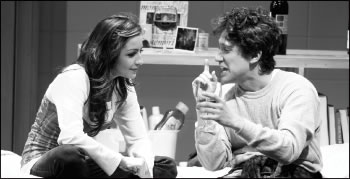BY JERRY TALLMER
Greeks, professors know the most clever truth wins
When I was one-and-twenty
I heard a wise man say,
‘Give crowns and pounds and guineas
But not your heart away;
Give pearls away and rubies
But keep your fancy free.’
But I was one-and-twenty,
No use to talk to me.
*
When I was one-and-twenty
I heard him say again,
‘The heart out of the bosom
Was never given in vain;
‘Tis paid with sighs a plenty
And sold for endless rue.’
And I am two-and-twenty,
And oh, ‘tis true, ‘tis true.
—A.E. Housman
Anybody who was ever one-and-twenty can relate to the rueful young cynical idealists in Jonathan Marc Sherman’s “Sophistry,” though it helps if you were also in those years a junior or senior at that prototypical “small New England college” where so many plays and novels and movies nowadays take place. It helps even more if the campus in question is at sword’s points over a charge of sexual abuse brought against a popular oddball professor of philosophy.
It is that same professor, Whitey McCoy, who right at the beginning of the play elucidates what the Sophists of ancient Greece were all about: It wasn’t whether they were right or wrong, it was the cleverness of how they “argued both sides of an argument, sharpened their skills, became better, more clever, more persuasive…” In short, a bunch of double-talkers — everything most despicable to the emotionally tangled truth-seeking young idealists about to be dispatched, graduated, into the wide, wide world.
They are, in the entanglement at the Samuel Beckett on West 42nd Street, pot-smoking senior-year rock-band buddies Willy (last name unknown) and Ex (Xavier Reynolds); herky-jerky intrusively lonely campus courier Igor Konigsberg; uncompromising student editor/reporter Robin Smith (who has broken up with Ex); round-heeled undergraduate cutie pie Debbie (last name unknown); and Jack Kahn, the misanthropic misfit who has accused Professor McCoy of making an erotic pass hors du classe, so to speak.
Plus, of course, Whitey McCoy himself, and Quintana Matheson, president of the college, who, to the outrage of Ex and Robin and many others, is hemming and hawing and obfuscating (and subsequently buying off) the ouster of Professor McCoy.
This is the second time round in New York for “Sophistry,” which had a workshopping by Playwrights’ Horizons in the spring of 1993, and a full run there that fall headed by the always on-the-mark Austin Pendleton as Whitey McCoy.
Under the direction of James Warwick, the current actors are Jonathan Hogan as Whitey, Maximilian Osinski as Willy, Ian Alda as Igor, Charlie Hewson as Ex, Natalie Knepp as Robin, Michael Carbonaro as the accusatory Jack Kahn, Mahira Kakkar as Debbie, and Ellen Dolan as President Quintana Matheson.
“Sophistry” was Jonathan Marc Sherman’s third full-length oeuvre. “Oeuvre,” he said with a laugh over the phone last week. “A great Scrabble word. Gets rid of a V.”
A 1993 photo in the Dramatists Play Service text of “Sophistry” displays two young guys — Ethan Hawke as Ex, Steve Zahn as Willy — banging away on guitar and (I think) drums, while a third character, sprawled beside them, peruses a newspaper with a wicked grin on his face. This is Jonathan Sherman himself as ubiquitous Igor Konigsberg in that production.
He was then 25, having been born October 10, 1968, in Morristown, New Jersey, home state of the Bell Laboratories where his father worked.
“At the time I wrote it I felt like a real expert,” says Sherman. “I’ve come to realize how young I was.”
When he was even younger, in the 6th grade in Livingston, N.J., “a teacher told me I talk back a lot, so I might do well in acting classes. So I started at age 11 or 12, and then went on to theater camp — yes! — at the Karmel Hotel in the Catskills, the first of four summers there that were incredibly formative.”
“My wife got so sick hearing about it that she made a documentary film about it, called ‘Stagedoor.’” His wife, Alexandra Shiva, mother of their 2-year-old Sam, is better known for her documentary film “Bombay Eunuch.”
In any event, Sherman has been stage-struck ever since age 11, summers at theater camp, other seasons at the American Academy of the Arts on Madison Avenue at 30th Street. “I’d come there on Saturday mornings, then in the afternoons go to a matinee somewhere in the city.”
The actual campus on which “Sophistry” is set, he let slip out, is the famously progressive Bennington College, in Vermont, from which — “when they turned off the heat in midwinter” — Jonathan would come down to New York to take part in the Young Playwrights Festival with this and other birth-process works.
As for the “Sophistry” case of sexual aggression — two cases, really, of somebody making an uninvited male-on-male pass at someone else — (1) teacher/student (alleged), (2) student/student (actual) — “There had been more than one such incident,” says Bennington graduate Sherman, “but the [Whitey McCoy] one in the play is fiction.”
In any event, says the playwright, “you get two different versions of the same story” — sophistry or no sophistry.
Aha! The “Rashomon” effect?
“Exactly,” said Jonathan Marc Sherman.
Bennington had given him a degree, BA in Drama—“They may regret it, but they did” — whereupon he dropped out of Yale Drama graduate school after a month. “Hated New Haven, hated the program.”
Austin Pendleton, the onetime Whitey McCoy, is a little too white-haired these days to fit the part, but playwright and sometime actor Sherman reveres actor-director-playwright Pendleton. “Austin Pendleton,” says Jonathan Marc Sherman, “makes it exciting and fun for me to keep writing plays.”
And that ain’t no sophistry.






























